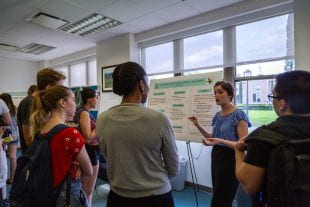Rice undergraduates share their yearlong humanities-based projects with poster presentations
When Josephine Tittsworth founded the Texas Transgender Nondiscrimination Summit (TXTNS) in 2009, only three universities in Texas — Rice was one of them — had nondiscrimination policies with protections for gender identity and gender expression.
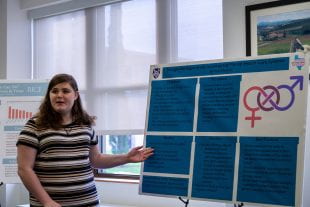
Baker College junior Hazel Marshall spent the last two semesters assessing the needs of transgender students who access mental health care through their universities. (Photos by Haoming Ning)
The longtime transgender rights activist knew that feeling unsafe or unwelcome was a hindrance to getting a good education, and by 2016, Tittsworth’s work through TXTNS helped create inclusive policies at 38 university systems and five Texas school districts.
A decade after founding TXTNS, Tittsworth is continuing to fight for the well-being of transgender students on campuses across the state, this year partnering with Rice student Hazel Marshall for a yearlong research project.
With Tittsworth’s help, Marshall spent the last two semesters assessing the needs of transgender students who access mental health care through their universities. In the end, she was able to create a list of best practices for mental health care providers at universities to better address these students and their needs.
“This is my first poster presentation, especially at this scale” said Marshall, a Baker College junior studying linguistics and cognitive science, at an April 24 reception in Rayzor Hall highlighting her capstone project. “It was definitely incredibly fun and really meaningful to be able to work more in the social sciences and work with individuals in order to create something big like this.”
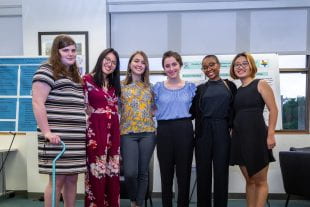
Rice students presented six capstone projects April 24 for the Seminar and Practicum in Engaged Research through Rice’s Center for Women, Gender and Sexuality.
Martin’s poster presentation was one of six such capstone projects for the Seminar and Practicum in Engaged Research through Rice’s Center for Women, Gender and Sexuality (CSWGS). Rice students partnered with Houston community organizations to conduct feminist-oriented research on such topics as abortion access and sex education.
In many cases, Rice undergraduates don’t have access to a pool of relevant human subjects for such research, nor do they have experience with the rigorous requirements of an institutional review board (IRB), which protects the rights of human research subjects and ratifies such research at universities.
That’s where CSWGS professors and their community partners come in.
‘Living on in ways we can’t predict’
Over the last year, professors Brian Riedel and Stephanie Santos have guided students through creating stringent methodologies around their research and have connected them with community partners such as Tittsworth and TXTNS.
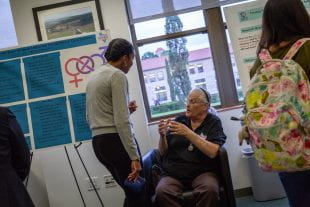
Community partners such as Josephine Tittsworth, founder of the Texas Transgender Nondiscrimination Summit, helped students with their research.
In addition to providing Marshall with contacts and resources, Tittsworth shared articles and other scholarly research during monthly catch-up conversations.
“It was really a nice experience,” said Tittsworth, who attended the poster presentation in a show of support.
Marshall, who hopes to pursue work in transgender health needs, was just as enthusiastic about the chance to work so closely with such an important and well-connected advocate in the transgender community.
“Josephine has given me so many amazing resources in order to get all this done,” she said. “It’s not my first major research project, but it is definitely the first one where I’ve been able to work with the community so closely.”
In the 12 years that CSWGS has offered its seminar and practicum in engaged research, it has partnered with over 40 agencies and helped 79 students conduct the sort of humanities-based research typically not undertaken until grad school.
“The impact that this has had on Houston and the broader Texas community is palpable,” Riedel said. “The projects themselves end up living on in ways we can’t predict.”
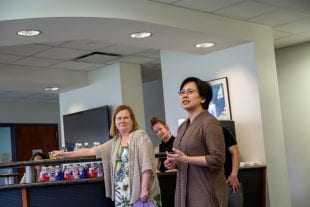
“Together, this group of amazing young scholars have thought about the discursive power of research categories,” said professor Stephanie Santos at the April 24 reception.
Some of them have been published in peer review journals; others have circulated as white papers in the halls of the Texas Capitol in Austin.
The impact on the students is equally extensive.
“Together, this group of amazing young scholars have thought about the discursive power of research categories,” Santos said. “They’ve reflected on how our relations are embedded in the research process itself. They’ve reflected on their own positionality and their responsibilities as researchers and as community members. And they have developed over two semesters research practices that are rigorous and collaborative, which is not the norm.”
“Even more amazing for me is that they’re just beginning,” she continued. “For many of them, this is their first IRB research project and they’ve already contributed so much.”
‘Is this impossible?’
Jones College senior Senyte Pierce is double-majoring in CSWGS and kinesiology, and while she’s done work with Baylor’s Center for Medical Ethics in preparation for a career in public health, this was her first deep-dive research project and poster presentation.
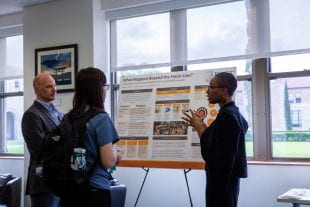
Jones College senior Senyte Pierce presented her capstone project with Houston nonprofit Bel Inizio as professor Brian Riedel listens.
Pierce was already volunteering with a local nonprofit when she signed up for the seminar and practicum course. Houston-based Bel Inizio helps disadvantaged women develop self-confidence and healthy life skills through teaching them fitness and nutrition. When Pierce joined the small and nimble group as an intern, she brought the total number of Bel Inizio staff to three.
“It’s insane; they do so much work,” Pierce said of Bel Inizio’s two full-time employees: the CEO and program manager.
Pierce spent the summer training a group of previously incarcerated women who were completing a drug rehabilitation program to run a 5K. It was Pierce’s first 5K, too.
“That’s me at the 5K,” she said, pointing to a photo on her poster picturing her with her Bel Inizio cohort at the finish line. “It was just incredible watching the growth and pride whenever they were done with the 5K. It helps them with healthy coping mechanisms, with healthy stress relief.”
Riedel and Santos helped Pierce prove what she hoped was true: Bel Inizio’s work with these women has long-term effects beyond the socialization and in-person support of the training and health programs. This is true whether it’s administered while the women were still in prison, in transitional housing post-incarceration or during drug rehabilitation treatments.
“I found that not only is Bel Inizio doing what it needs to be doing, but that it’s carrying throughout their lives once they’re finished with their prison sentence,” Pierce said of her project, which included everything from interviews with previous participants to quantifiable metrics on success rates. “I’m really happy about this.
“I’m about to text the CEO and the program manager, ‘You did it!’ That’s what I proved,” she said. “Y’all did what you said you were going to do with this nonprofit.”
Most students, Pierce said, don’t complete IRB-level research until they’re working on a doctorate. “But we did it now.”
“We were like, ‘Is this impossible? Can we do that? Do we have the capability — not necessarily intellectually but in terms of resources — to actually finish?’” she said. “But Brian and Stephanie were like, ‘You’re going to do this,’ and we did it.
“It was an incredible experience.”
